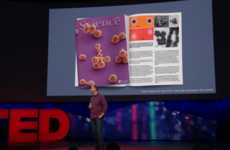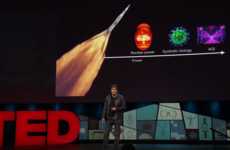
Need Inspiration?
Get inspired by 4,000+ keynote speaker videos & our founder, a top keynote speaker on innovation.
Kai-Fu Lee's Keynote on Artificial Intelligence Reveals a Possible Relationship
Kalin Ned — August 15, 2018 — Keynote Trends
Dr. Kai-Fu Lee is an investor with a background in computer science and he delivers a hopeful keynote on artificial intelligence which outlines the future integration of technology into the working world. With extensive experience of the North American and Chinese markets, the speaker argues that to successfully coexist with AI, humans must rethink their priorities.
The AI era of discovery began approximately 10 years ago and it was driven by North American scientists. The groundbreaking discovery from that period is known as 'deep learning' — a feature that enables computers to process huge amounts of data with the ability to predict or decide with impeccable precision. Today, the world is in the era of AI implementation and what matters most is the optimization of technology, equipment and algorithms to deliver the best possible execution strategies, product quality and efficiency. China is leading this movement.
What Kai-Fu Lee goes on to reveal in his keynote on artificial intelligence is the fiercely competitive environment in the East, which he so vividly describes as "a truly gladiatorial fight to the death." With impregnable business models, ever-faster algorithms and an enormous market that enables a greater variety of data collection, the most valuable "companies in computer vision, speech recognition, speech synthesis, machine translation and drones are all Chinese."
As the East and the West are working together to drive the fastest revolution in digital technology the world has ever experienced, the implications point to a steady crisis in potential job replacements. Kai-Fu Lee's keynote on artificial intelligence affirms that there is a possibility of AI robots taking up the jobs of customer service representatives, truck drivers, manufacturers and even hematologists. However, the speaker does highlight the possibility of co-existence. Kai-Fu Lee states that as humans we have come to think that "work defines the meaning of our lives." However, to the contrary, why we exist is to love. Thus, AI technology might be taking up routine jobs but they are not taking the human essence. By accessing the potential behind the things AI just can't do — Kai-Fu Lee refers to these as the "axis of creativity" and the "axis of compassion, love or empathy" in his keynote on artificial intelligence, humans are able to find a way to survive and thrive.
The AI era of discovery began approximately 10 years ago and it was driven by North American scientists. The groundbreaking discovery from that period is known as 'deep learning' — a feature that enables computers to process huge amounts of data with the ability to predict or decide with impeccable precision. Today, the world is in the era of AI implementation and what matters most is the optimization of technology, equipment and algorithms to deliver the best possible execution strategies, product quality and efficiency. China is leading this movement.
What Kai-Fu Lee goes on to reveal in his keynote on artificial intelligence is the fiercely competitive environment in the East, which he so vividly describes as "a truly gladiatorial fight to the death." With impregnable business models, ever-faster algorithms and an enormous market that enables a greater variety of data collection, the most valuable "companies in computer vision, speech recognition, speech synthesis, machine translation and drones are all Chinese."
As the East and the West are working together to drive the fastest revolution in digital technology the world has ever experienced, the implications point to a steady crisis in potential job replacements. Kai-Fu Lee's keynote on artificial intelligence affirms that there is a possibility of AI robots taking up the jobs of customer service representatives, truck drivers, manufacturers and even hematologists. However, the speaker does highlight the possibility of co-existence. Kai-Fu Lee states that as humans we have come to think that "work defines the meaning of our lives." However, to the contrary, why we exist is to love. Thus, AI technology might be taking up routine jobs but they are not taking the human essence. By accessing the potential behind the things AI just can't do — Kai-Fu Lee refers to these as the "axis of creativity" and the "axis of compassion, love or empathy" in his keynote on artificial intelligence, humans are able to find a way to survive and thrive.
6
Score
Popularity
Activity
Freshness
















